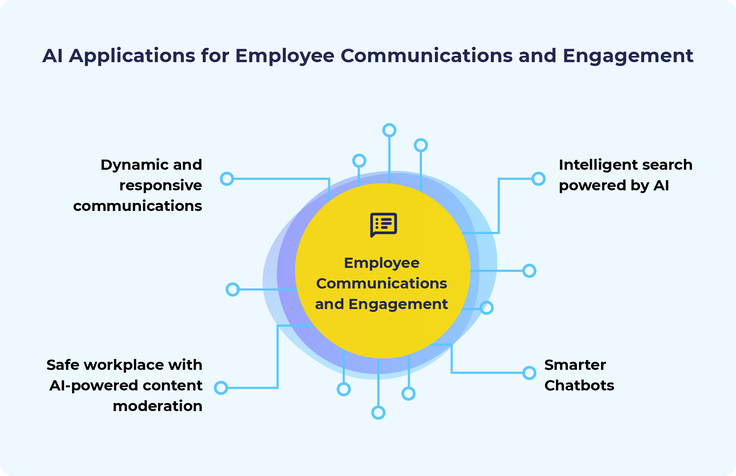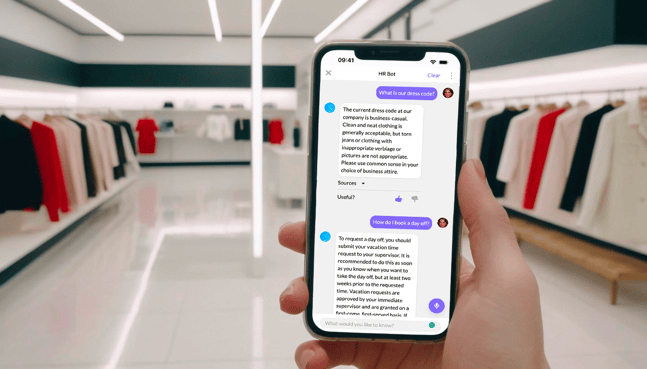Mar 7, 2024 3:13:55 PM
Communications | AI
Mar 7, 2024 3:13:55 PM
Communications | AI

Effective retail communication is essential for orchestrating seamless operations and delivering exceptional customer experiences.
But according to a recent survey, 34% of frontline employees feel disconnected from their HQ teams, a gap that significantly hampers the overall operational efficiency and employee morale.
This is because traditional retail store communication systems often fail to meet the needs and expectations of today's retail workforce. They are often outdated, inefficient, or unreliable, leading to low adoption and poor employee engagement and operational performance.
Recognizing this challenge, many retailers have implemented innovative and modern retail communication solutions for their frontline teams.
Yet, the integration of Artificial Intelligence (AI) into retail communication strategies marks a significant leap forward, opening up new avenues to streamline frontline communications, enhance employee experiences, and foster a more connected and efficient workforce.
In this blog post, we will explore some of the benefits and use cases of using AI to transform frontline worker communications in retail.
Retail is a fast-paced and dynamic industry that requires effective communication between frontline workers, regional managers, and corporate teams.
But effective communication in retail is more than just the exchange of information, it's about creating a cohesive network where frontline workers feel aligned, informed, and motivated.
Traditionally, retail store communication systems have struggled to meet the dynamic needs of dispersed teams, often leading to gaps in knowledge, inconsistency in execution, and, ultimately, a disjointed customer experience.
The advent of AI-powered retail communication solutions is addressing these challenges head-on. By leveraging AI tools for frontline workers, retail organizations can ensure their teams are not just connected but are also engaging in meaningful, impactful interactions that drive organizational success.
Artificial Intelligence use cases in retail span various aspects of operations, but they are particularly influential in transforming frontline communications.

Here are some examples of AI applications in retail communications:
 YOOBIC’s AI-powered assistant helps frontline workers find the information they need when they need it
YOOBIC’s AI-powered assistant helps frontline workers find the information they need when they need it
The adoption of AI in retail communications offers sizable benefits, directly impacting the efficiency and efficacy of frontline teams. Key benefits include:
There are several advantages of incorporating AI into retail communication systems. For employees who interact with customers directly, these tools can help reduce the mental effort required to manage information and complete tasks. Real-time access to relevant communication helps them make informed decisions quickly, enabling them to respond to customer needs more efficiently. This empowerment leads to a more committed workforce that is more likely to seek innovative solutions and solve problems, which ultimately enhances the overall employee experience.
From a customer perspective, the ripple effects of efficient, AI-driven frontline communications manifest as superior service quality and personalized shopping experiences.
When frontline workers are well-informed and supported by intelligent tools, their interactions with customers become more meaningful and impactful. This not only boosts customer satisfaction and loyalty but also positions the brand as a forward-thinking, customer-centric organization.
The evolution of retail store communication systems towards AI-driven solutions marks a significant shift in how retail operations will be managed moving forward.
Retailers seeking to enhance their communication infrastructure must recognize the importance of adopting AI-powered solutions. These next-generation tools offer more than just improved efficiencies; they provide a strategic advantage in elevating the frontline employee experience, which in turn, dramatically enhances the customer journey.
By harnessing AI, retailers can significantly enhance the way they communicate with their employees, leading to better-informed, more engaged, and highly efficient teams. This transition to AI-powered retail communication solutions is not just a trend but a fundamental shift that optimizes both the frontline employee and customer experience.
In conclusion, as the retail industry continues to navigate through the complexities of modern consumer expectations and operational challenges, the adoption of AI in retail communications emerges as a key differentiator.
Retailers that embrace AI-powered solutions for their communication needs are not only positioning themselves for operational excellence but are also paving the way for a more connected, engaged, and satisfied workforce.
This strategic focus on enhanced communication systems is not just an operational upgrade but a transformative move toward building a more resilient, customer-centric retail ecosystem.
Want to learn more about AI applications in retail? Download this new AI Playbook for retail leaders to discover top AI use cases to transform frontline operations and maximize ROI.
Search the blog
Popular Posts

See why 350+ businesses are using YOOBIC
YOOBIC creates a better everyday working experience for frontline teams while helping businesses drive performance at scale.
PRODUCT
See why 350+ businesses are using YOOBIC
YOOBIC creates a better everyday working experience for frontline teams while helping businesses drive performance at scale.